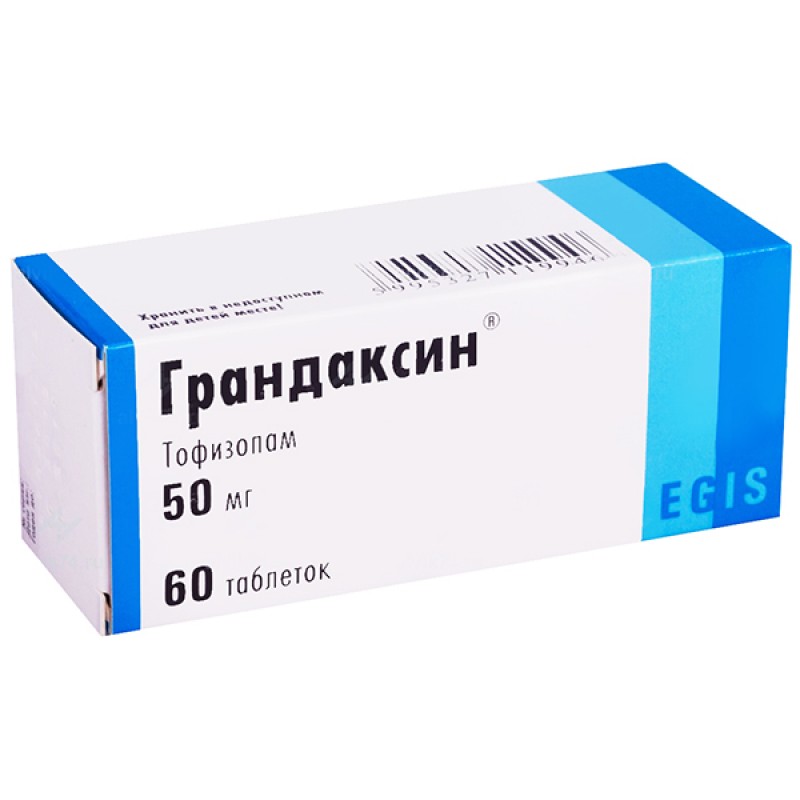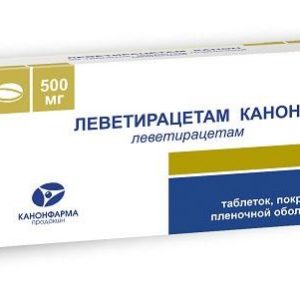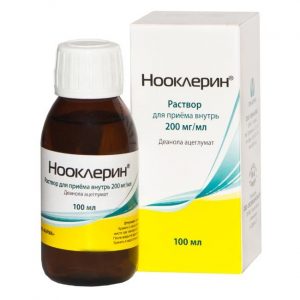Description
release form
Tablets
packaging 60 pcs
Pharmacological action
Grandaxinum – a drug from the group of benzodiazepine derivatives (an atypical benzodiazepine derivative), has an anxiolytic effect, which is almost not accompanied by a sedative, muscle relaxant, anticonvulsant effect. It is a psycho-vegetative regulator that eliminates various forms of autonomic disorders. It has moderate stimulating activity.
Due to the lack of muscle relaxant effect, the drug can also be used in patients with myopathy and myasthenia gravis. Due to the atypical nature of the chemical structure, unlike the classic benzodiazepine derivatives, Grandaxin ® in therapeutic doses practically does not cause the development of physical, mental dependence and withdrawal syndrome.
Grandaxin ® is a daily anxiolytic.
Pharmacokinetics
When taken orally, it is rapidly and almost completely absorbed from the digestive tract. Cmax in the blood is reached within 2 hours, after which the plasma concentration decreases monoexponentially. Tofisopam is not cumulated in the body. Its metabolites do not have pharmacological activity. It is excreted mainly in urine (60 80%) in the form of conjugates with glucuronic acid and to a lesser extent (about 30%) with feces. T1 / 2 is 6 8 hours.
Indications
Neuroses and neurosis-like states – conditions accompanied by: Emotional stress.
Vegetative Disorders.
Moderately severe anxiety.
apathy.
Reduced activity.
Obsessive experiences.
Reactive depression with mild psychopathological symptoms.
Mental adaptation disorder (post-traumatic stress disorder).
Menopausal syndrome (as an independent tool, as well as in combination with hormonal drugs).
Syndrome of premenstrual tension.
Cardialgia (as monotherapy or in combination with other drugs).
Alcohol withdrawal syndrome.
Myasthenia gravis, myopathies, neurogenic muscle atrophies and other pathological conditions with secondary neurotic symptoms in cases when anxiolytics with pronounced muscle relaxant effect are contraindicated.
Use during pregnancy and lactation
Grandaxin is contraindicated for use in the first trimester of pregnancy and during lactation.
Composition
1 tablet contains:
Active substances: tofisopam 50 mg.
Excipients: stearic acid, magnesium stearate, gelatin, talc, potato starch, lactose monohydrate, microcrystalline cellulose.
Dosage and administration
Set individually, taking into account the condition of the patient, clinical form of the disease and individual sensitivity to the drug.
Adults are prescribed 50-100 mg (1-2 tablets) 1-3 times / day. The maximum daily dose of 300 mg.
Children over 14 years of age are prescribed up to 200 mg / day.
To prevent the disorder of falling asleep, the drug is recommended to be taken no later than 15-16 hours a day.
In elderly patients and patients with renal failure, the daily dose is reduced by about 2 times.
In case of alcohol withdrawal syndrome, a short course of therapy is indicated for the prevention and treatment of delirium: from several days to 3-6 weeks.
Side effects of
From the gastrointestinal tract: decreased appetite, constipation, increased gas separation, nausea, dry mouth. In some cases, congestive jaundice is possible.
From the side of the central nervous system: headache, insomnia, increased irritability, psychomotor agitation, confusion may be observed, convulsive seizures may occur in patients with epilepsy.
Allergic reactions: exanthema, scarlet fever-like exanthema, pruritus.
From the side of the musculoskeletal system: muscle tension, muscle pain.
From the respiratory system: respiratory depression.
Drug Interaction
The concomitant use of tacrolimus, sirolimus, cyclosporine and tofizopam is contraindicated. Blood plasma concentrations of CYP3A4 metabolised drugs, may increase with concomitant administration with tofizopom.
The use of tofizopam with drugs that suppress CNS functions (analgesics, general anesthesia, antidepressants, H1-antihistamines, sedatives, hypnotics, antipsychotics), enhances their effects (such as sedation or respiratory depression).
Inducers of hepatic enzymes (alcohol, nicotine, barbiturates, antiepileptic drugs) can increase metabolism of tofizopam, which can lead to a decrease in its concentration in the blood plasma and weaken the therapeutic effect.
Some antifungal drugs (ketoconazole, itraconazole) can slow down the hepatic metabolism of tofizopam, leading to an increase in its concentration in blood plasma.
Some antihypertensive drugs (clonidine, calcium channel antagonists) may enhance the effects of tofizopam. Beta-blockers can slow the metabolism of the drug, but this effect is not clinically relevant.
Tofizopam may increase the level of digoxin in the blood plasma.
Benzodiazepines can affect the anticoagulant effect of warfarin.
Prolonged use of disulfiram may inhibit the metabolism of tofizopam.
Antacids can affect the absorption of tofizopam. Cimetidine and omeprazole inhibit the metabolism of tofizopam.
Oral contraceptives may reduce the metabolism of tofizopam.
Tofizopam attenuates the depressing effect of alcohol on the CNS.
Overdose
Symptoms: drowsiness, slight respiratory depression, in severe cases – coma.
Treatment: Carrying out activities aimed at restoring respiratory function and cardiovascular activity. Gastric lavage and activated charcoal are recommended. In emergency cases, the use of a specific benzodiazepine antagonist flumazenil may be possible.
Storage conditions
The drug should be stored at a temperature of 15 ° to 25 ° C.
Expiration
5 years.
dosage form
dosage form
tablets




